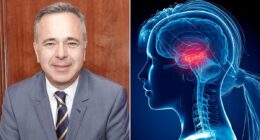Share this @internewscast.com
A natural compound found in green tea forms a powerful brain cleaner which can protect against Alzheimer’s, new research suggests.
When combined with a common vitamin, scientists have found it can potentially put the brakes on the buildup of waste associated with the disease.
Published in the journal GeroScience, the study pinpointed two natural compounds: nicotinamide, a type of vitamin B3, and epigallocatechin gallate, an antioxidant found in green tea.
Epigallocatechin gallate can help restore a key molecule that fuels energy production in brain cells.
Nicotinamide is a type of vitamin B3 that’s made naturally in the body from niacin-rich foods such as cereals, fish, nuts, legumes, and eggs.
The research highlighted that nerve cells exposed to these compounds not only showed reversal in age-related decline but also improved their ability to eliminate amyloid protein clusters, a key characteristic of Alzheimer’s disease.
Alzheimer’s stands as the primary cause of dementia. Although it remains incurable at present, early detection is deemed pivotal for better management since treatments can alleviate symptoms and decelerate its advancement.
This finding has generated enthusiasm among experts, as these compounds can be consumed through a nutritious diet and are readily available as dietary supplements already approved by safety authorities.

A natural compound found in green tea forms a powerful brain cleaner which can protect against Alzheimer’s, according to scientists

Alzheimer’s is the leading cause of dementia, and while not yet curable, early diagnosis is considered critical for better outcomes as treatments

A graphical abstract of the study, which was published in the journal GeroScience by researchers from the University of California Irvine
The findings are the result of a study by researchers at the University of California Irvine (UC Irvine).
Gregory Brewer, the study’s principal investigator, stated: ‘As individuals age, their brains exhibit a reduction in neuronal energy levels, impairing their capacity to clear out unwanted proteins and damaged elements.’
‘We found that restoring energy levels helps neurons regain this critical cleanup function.
‘By enhancing the brain’s energy systems with compounds accessible as dietary supplements, we might discover a novel approach to addressing age-related cognitive decline and Alzheimer’s disease.’
The study was carried out on aged mice neurons showing signs of Alzheimer’s, with the researchers finding the compounds – epigallocatechin gallate and nicotinamide – were shown to boost the energy molecule guanosine triphosphate (GTP).
GTP provides essential energy for cleaning up dead brain cells, with a lack of it having previously been linked to the development of Alzheimer’s.
The scientists found that when aged nerve cells were treated for just 24 hours with the molecules nicotinamide and epigallocatechin gallate, the GTP levels were restored to levels typically seen in younger cells.

Pictured: An Alzheimer’s affected brain, with abnormal levels of amyloid protein clumping together to form plaques
‘This study highlights GTP as a previously underappreciated energy source driving vital brain functions,’ said Brewer.
‘We found that restoring energy levels helps neurons regain this critical cleanup function.’
Alzheimer’s disease is believed to be caused by the development of toxic amyloid and beta proteins in the brain, which can accumulate in the brain and damage cells responsible for memory.
Amyloid protein molecules stick together in brain cells, forming clumps called plaques. At the same time, tau proteins twist together in fiber-like strands called tangles.
The plaques and tangles block the brain’s neurons from sending electrical and chemical signals back and forth.
Over time, this disruption causes permanent damage in the brain that leads to Alzheimer’s disease and dementia, causing patients to lose their ability to speak, care for themselves or even respond to the world around them.

A dementia expert explained when you need to worry about memory loss (stock image)
While there is no clear cause of Alzheimer’s disease, experts believe it can develop due to genetic mutations and lifestyle choices, such as physical inactivity, unhealthy diet and social isolation.
Alzheimer’s disease is the most common form of dementia and is associated with the abnormal build-up of amyloid and tau proteins in the brain.
It accounts for over half—around 60 per cent—of cases, and according to figures released by the Alzheimer’s Society last year, more than a million people are thought to have the condition.
Alzheimer’s disease is the most common form of dementia and is associated with the abnormal build-up of amyloid and tau proteins in the brain.
Alzheimer’s Research UK analysis found 74,261 people died from dementia in 2022 compared with 69,178 a year earlier, making it the country’s biggest killer.
Currently there is no cure for dementia or Alzheimer’s.
But new drugs can slow down its progression and the earlier it is spotted the more effective treatments are.












